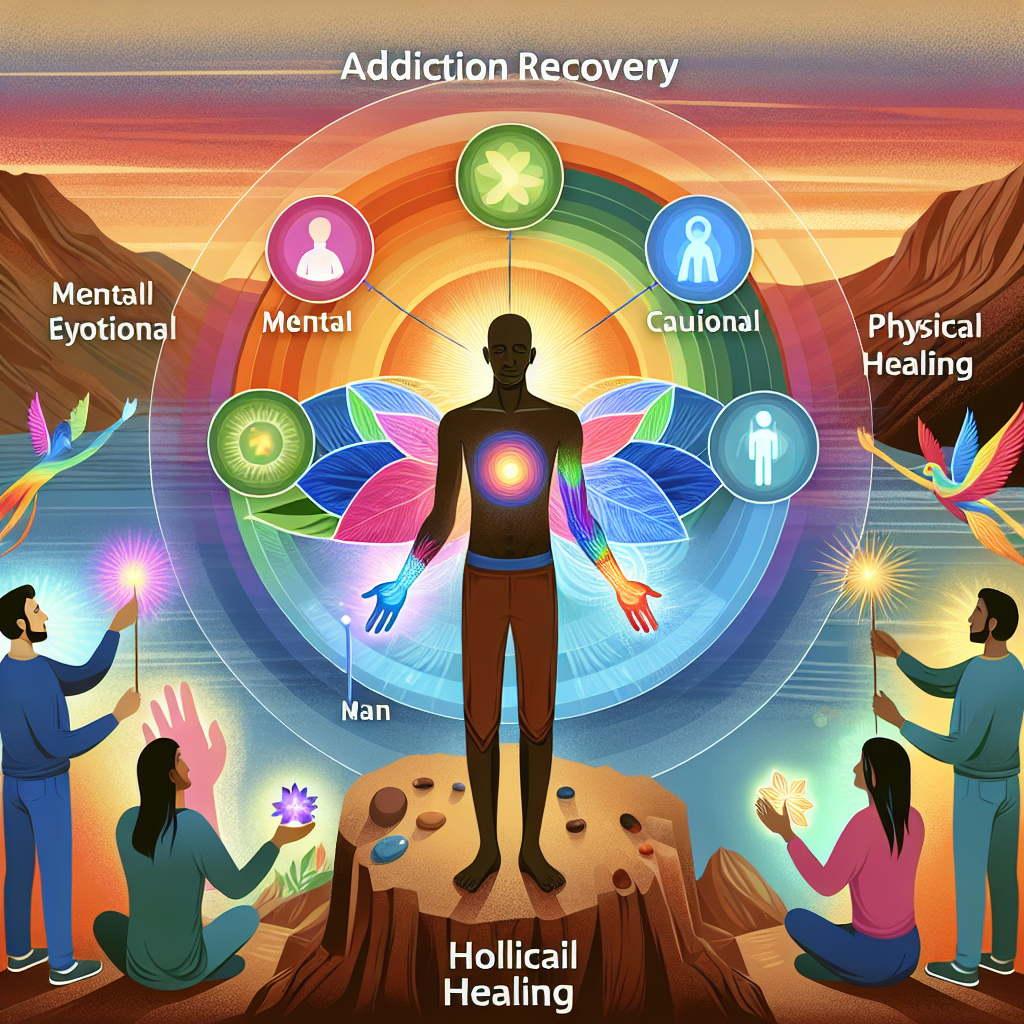-
Table of Contents

“Holistic Healing: Transforming Lives Beyond Addiction”
Introduction
Addiction recovery is a multifaceted journey that extends beyond merely ceasing substance use. It necessitates a comprehensive approach that addresses the physical, emotional, mental, and spiritual dimensions of an individual. Healing the whole person is crucial because addiction often stems from and exacerbates underlying issues such as trauma, mental health disorders, and emotional pain. By focusing on holistic recovery, individuals are more likely to achieve lasting sobriety and overall well-being. This approach fosters resilience, self-awareness, and a deeper understanding of one’s needs and triggers, ultimately leading to a more fulfilling and balanced life.
Holistic Approaches in Addiction Recovery: Healing the Mind, Body, and Spirit
Addiction recovery is a multifaceted journey that requires more than just addressing the physical dependence on substances. To truly heal, it is essential to consider the mind, body, and spirit as interconnected components of a person’s overall well-being. This holistic approach to addiction recovery recognizes that healing the whole person is crucial for achieving lasting sobriety and a fulfilling life.
One of the primary reasons for incorporating holistic methods in addiction recovery is the understanding that addiction often stems from deeper psychological and emotional issues. Traditional treatment methods, which focus primarily on detoxification and abstinence, may not address the underlying causes of addiction. By integrating therapies that target mental health, such as cognitive-behavioral therapy (CBT) and mindfulness practices, individuals can begin to uncover and heal the root causes of their addictive behaviors. These therapies help individuals develop healthier coping mechanisms, improve emotional regulation, and build resilience against future triggers.
In addition to mental health, physical well-being plays a significant role in the recovery process. Substance abuse can take a severe toll on the body, leading to nutritional deficiencies, weakened immune systems, and chronic health conditions. Holistic approaches emphasize the importance of restoring physical health through proper nutrition, regular exercise, and alternative therapies like acupuncture and yoga. These practices not only help to repair the damage caused by addiction but also promote overall physical vitality, which is essential for maintaining long-term sobriety.
Moreover, the spiritual aspect of recovery is often overlooked in conventional treatment programs. However, many individuals find that reconnecting with their spiritual selves provides a sense of purpose and meaning that is vital for sustained recovery. Spirituality does not necessarily refer to religious beliefs; rather, it encompasses a broader sense of connection to something greater than oneself. This can be achieved through practices such as meditation, prayer, or spending time in nature. By nurturing the spirit, individuals can cultivate inner peace, self-awareness, and a sense of belonging, all of which are crucial for overcoming addiction.
Furthermore, holistic approaches to addiction recovery often include complementary therapies that support the healing of the mind, body, and spirit. Art therapy, for example, allows individuals to express their emotions and experiences creatively, facilitating emotional release and self-discovery. Similarly, equine therapy, which involves interactions with horses, can help individuals develop trust, empathy, and communication skills. These therapies provide alternative avenues for healing that can be particularly beneficial for those who may not respond well to traditional methods.
Incorporating holistic approaches into addiction recovery also fosters a sense of community and support. Group therapy sessions, support groups, and family counseling are integral components of holistic treatment programs. These settings provide a safe space for individuals to share their experiences, gain insights from others, and build a network of support that is essential for long-term recovery. The sense of connection and understanding that comes from being part of a supportive community can significantly enhance the recovery process.
Ultimately, healing the whole person in addiction recovery is about recognizing and addressing the complex interplay between the mind, body, and spirit. By adopting a holistic approach, individuals are empowered to not only overcome their addiction but also to build a healthier, more balanced, and fulfilling life. This comprehensive method of treatment acknowledges that true recovery is not just about abstaining from substances but about achieving overall well-being and personal growth. Through holistic healing, individuals can find the strength and resilience needed to navigate the challenges of recovery and embrace a brighter future.
The Importance of Comprehensive Care in Overcoming Addiction: Addressing Emotional, Physical, and Mental Health
Addiction recovery is a multifaceted journey that requires more than just abstaining from substance use. To truly overcome addiction, it is essential to address the emotional, physical, and mental health of the individual. This comprehensive approach, often referred to as holistic care, recognizes that addiction affects every aspect of a person’s life and that healing must occur on multiple levels for recovery to be sustainable.
Firstly, emotional health is a critical component of addiction recovery. Many individuals turn to substances as a way to cope with unresolved emotional pain, trauma, or stress. Therefore, addressing these underlying emotional issues is paramount. Therapy, whether it be cognitive-behavioral therapy, dialectical behavior therapy, or other forms, provides a safe space for individuals to explore their emotions, understand their triggers, and develop healthier coping mechanisms. Additionally, support groups offer a sense of community and understanding, allowing individuals to share their experiences and gain strength from others who have faced similar challenges.
In conjunction with emotional healing, physical health cannot be overlooked. Substance abuse often takes a significant toll on the body, leading to a range of health issues such as malnutrition, liver damage, and cardiovascular problems. A comprehensive recovery plan should include medical care to address these physical ailments. Regular exercise and a balanced diet are also crucial, as they help to restore the body’s natural balance and improve overall well-being. Physical activity, in particular, has been shown to reduce stress, improve mood, and increase energy levels, all of which are beneficial in the recovery process.
Moreover, mental health is intricately linked to both emotional and physical well-being. Many individuals struggling with addiction also suffer from co-occurring mental health disorders such as depression, anxiety, or bipolar disorder. It is essential to address these conditions simultaneously with addiction treatment to ensure a holistic recovery. Psychiatric care, including medication management and therapy, can help individuals manage their mental health symptoms and reduce the risk of relapse. Mindfulness practices, such as meditation and yoga, can also be beneficial in promoting mental clarity and emotional stability.
Transitioning from the importance of addressing these individual aspects, it is clear that a holistic approach to addiction recovery is not just about treating the symptoms but about healing the whole person. This means creating a supportive environment that fosters growth and self-discovery. Engaging in activities that promote self-esteem and personal fulfillment, such as art therapy, music therapy, or volunteering, can provide individuals with a sense of purpose and direction. Building healthy relationships and a strong support network is also crucial, as it provides the encouragement and accountability needed to maintain sobriety.
Furthermore, spirituality can play a significant role in holistic recovery. For many, connecting with a higher power or finding meaning and purpose in life can provide a sense of hope and motivation. Whether through religious practices, meditation, or simply spending time in nature, spirituality can offer a source of comfort and strength.
In conclusion, overcoming addiction requires a comprehensive approach that addresses the emotional, physical, and mental health of the individual. By healing the whole person, rather than just focusing on the addiction itself, individuals are more likely to achieve lasting recovery and lead fulfilling lives. This holistic approach not only helps to prevent relapse but also empowers individuals to build a healthier, more balanced future.
Q&A
1. **Question:** Why is it important to address mental health in addiction recovery?
**Answer:** Addressing mental health in addiction recovery is crucial because mental health issues often co-occur with substance use disorders, and untreated mental health conditions can hinder the recovery process and increase the risk of relapse.
2. **Question:** How does incorporating physical health into addiction recovery benefit individuals?
**Answer:** Incorporating physical health into addiction recovery benefits individuals by improving overall well-being, reducing stress, and enhancing the body’s ability to heal, which supports long-term sobriety and reduces the likelihood of relapse.
Conclusion
Addiction recovery should include healing the whole person because addiction affects not just the physical body but also the mind, emotions, and spirit. A holistic approach addresses underlying issues such as trauma, mental health disorders, and emotional imbalances, which are often intertwined with substance abuse. By focusing on the whole person, recovery programs can provide comprehensive care that promotes long-term sobriety, personal growth, and overall well-being. This integrated method fosters resilience, self-awareness, and a healthier lifestyle, ultimately leading to a more sustainable and fulfilling recovery journey.



